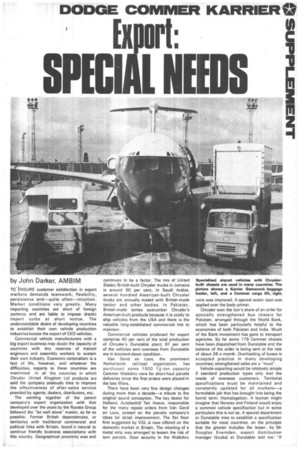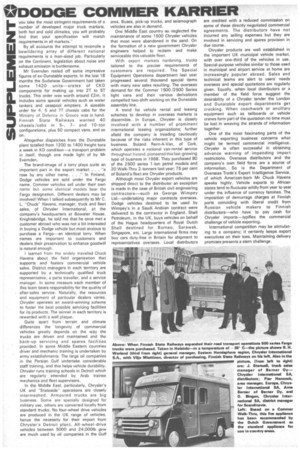SPEC E l i ArilEEDS by John Darker, AMBIM
Page 105

Page 106

If you've noticed an error in this article please click here to report it so we can fix it.
TO ENSURE customer satisfaction in export markets demands teamwork, flexibility, persistence and—quite often—intuition. Market conditions vary greatly. Many importing countries are short of foreign currency and are liable to impose drastic import curbs at short notice. The understandable desire of developing countries to establish their own vehicle production industries boosts the export of CKD vehicles.
Commercial vehicle manufacturers with a big export business may doubt the capacity of countries with tiny reserves of trained engineers and assembly workers to sustain their own industry. Economic nationalism is a fact of life, however, and whatever the difficulties, exports to these countries are maximized. In all the countries in which Chrysler United Kingdom Ltd products are sold the company zealously tries to improve the effectiveness of after-sales service provided by agents, dealers, distributors, etc.
The welding together of the parent company's export organization with that developed over the years by the Rootes Group followed the "let well alone" maxim, so far as possible. Former British dependencies, or territories with traditional commercial and political links with Britain, found it natural to continue friendly business associations with this country. Geographical proximity was and continues to be a factor. The mix of United States/British-built Chrysler trucks in Jamaica is around 50 per cent. In Saudi Arabia, several hundred American-built Chrysler trucks are annually mated with British-made tanker and other bodies. In Pakistan, British-made lorries outnumber Chrysler's American-built products because it is costly to ship vehicles from the USA and there is the valuable long-established commercial link to maintain.
Commercial vehicles produced for export comprise 40 per cent of the total production of Chrysler's Dunstable plant; 67 per cent of the vehicles sent overseas from Dunstable are in knocked-down condition.
Van Gend en Loos, the prominent Netherlands rail/road organization, has purchased some 1500 1+-ton capacity Commer Walkthru vans for short-haul parcels deliveries since the first orders were placed in the late fifties.
There have been very few design changes during more than a decade—a tribute to the original sound conception. The key dealer for Holland, Autobedrijf Ten Hoeve, responsible for the many repeat orders from Van Gend an Loos, passed on the parcels company's ideas for detail improvement. The flat floor first suggested by VGL is now offered on the domestic market in Britain. The rebating of a metal strip was arranged to lessen the risk of torn parcels. Door security in the Walkthru Specialized airport vehicles with Christerbuilt chassis ate used in many countries. The picture shows a Karrier Gamecock baggage loader, left, and a Commer cargo lift, right.
vans was improved. A special sealer coat was applied over the body primer.
Chrysler won the lion's share of an order for specially strengthened bus chassis for Pakistan, arranged through the World Bank, which has been particularly helpful to the economies of both Pakistan and India. Much of the Bank investment has gone to transport agencies. So far some 176 Commer chassis have been dispatched from Dunstable and the balance of the order is being sent at the rate of about 36 a month. Overloading of buses is accepted practice in many developing countries; strengthened axles are a "must".
Vehicle exporting would be relatively simple if standard production types only met the needs of overseas customers. Territorial specifications must be maintained and constantly updated for all markets—a formidable job that has brought into being the horrid term: Homologation. A layman might imagine that Norway and Finland would enjoy a common vehicle specification but in some particulars this is not so. A special department at Dunstable tries to establish a specification suitable for most countries, on the principle that the greater includes the lesser, As Mr Douglas Evernden, export distribution manager (trucks} at Dunstable told me: "If you take the most stringent requirements of a number of developed major truck markets, both hot and cold climates, you will probably find that your specification will match requirements in all markets."
By all accounts the attempt to reconcile a bewildering array of different national requirements is a man-sized job. Particularly on the Continent, legislation about noise and exhaust emission is burdensome.
Mr Evernden reeled off some impressive figures of ex-Dunstable exports. In the last 18 months the Sudanese Government had taken some 1420 units--crates of CKD components for making up into 2T to 5T trucks. This order was worth around £2m, It includes some special vehicles such as water tankers and cesspool emptiers. A sizeable order for 4, 5 and 7T chassis cabs for the MinIstry of Defence in Greece was in hand. Finnish State Railways wanted 40 chassis/cabs in 5-, 7and 10-ton configurations, plus 50 compact vans, and so on.
Altogether dispatches from the Dunstable plant totalled from 1200 to 1400 freight tons a week in KD condition--a transport problem in itself, though one made light of by Mr Evernden.
The brand-image of a lorry plays quite an important part in the export market . . . "a rose by any other name. . . ." In Finland, Dodge vehicles are sold under the Fargo name. Commer vehicles sell under their own name but some identical models bear the Fargo designation. Different dealers may be involved! When I talked subsequently to Mr C. L. "Chuck" Havens, manager, truck and fleet sales, of Chrysler International, at the company's headquarters at Bowater House, Knightsbridge, he told me that he once met a customer abroad who was not a bit interested in buying a Dodge vehicle but most anxious to purchase a Fargo—an identical lorry. When names are important to customers and dealers their preservation to enhance goodwill is natural enough.
I learned from the widely travelled Chuck Havens about the field organization that supports and fosters commercial vehicle sales. District managers in each territory are supported by a technically qualified truck representative, a parts traveller, and a service manager. In some measure each member of this team bears responsibility for the quality of after-sales service. Naturally, the resources and equipment of particular dealers varies. Chrysler operates an award-winning scheme to foster the best possible servicing facilities for its products. The winner in each territory is rewarded with a wall plaque.
Quite apart from terrain and climate differences the longevity of commercial vehicles greatly depends on the way the trucks are driven and maintained and the back-up servicing and spares facilities provided. In some Middle Eastern countries driver and mechanic training is undertaken by army establishments. The large oil companies in the Persian Gulf undertake considerable staff training, and this helps vehicle durability. Chrysler runs training schools in Detroit which are regularly attended by Arab trainee mechanics and fleet supervisors.
In the Middle East, particularly, Chrysler's UK and "Stateside" .operations are closely intermeshed. Armoured trucks are big business. Some are specially designed for military use, others are converted locally from standard trucks. No four-wheel drive vehicles are produced in the UK range of vehicles, hence the necessity for their import from Chrysler's Detroit plant. All-wheel-drive vehicles between 5000 and 24,000lb gvw are much used by oil companies in the Gulf area. Buses, pick-up trucks, and seismograph vehicles are also in demand.
One Middle East country so neglected the maintenance of some 1500 Chrysler vehicles that most were abandoned in the sand. On the formation of a new government Chrysler engineers helped to reclaim and make serviceable this valuable fleet.
With export markets hardening, trucks tailored to the precise requirements of customers are required. The Special Equipment Operations department last year progressed several thousand special items with many new sales resulting. The overseas demand for the Commer 1500 /2500 Series light vans and their various derivations compelled two-shift working on the Dunstable assembly line.
A trend for vehicle rental and leasing schemes to develop in overseas markets is discernible. In Europe, Chrysler is closely involved with a number of prominent international leasing organizations; further afield the company is treading cautiously because of the risks inherent in this type of business. Boland Rent-A-Van, of Cork, which operates a national van-rental service throughout Ireland, pioneered this fast-growing type of business in 1968. They purchased 80 of the 2500 series 1-ton petrol models and 20 Walk-Thru 2-tonners last year; 75 per cent of Boland's fleet are Chrysler products.
Although most Chrysler export vehicles are shipped direct to the distributor an exception is made in the case of British civil engineering contractors—such as George Wimpey Ltd—undertaking major contracts overseas. Dodge vehicles destined to be used by Wimpey's in a Saudi Arabian contract were delivered to the contractor in England. Shell Petroleum, in the UK, buys vehicles on behalf of the Hague headquarters of Royal Dutch Shell destined for Borneo, Sarawak, Singapore, etc. Large international firms may buy cars duty-free in Britain for shipment to representatives overseas. Local distributors are credited with a reduced commission on some of these directly negotiated commercial agreements. The distributors have not incurred any selling expenses but they are involved in servicing and spares provision in due course.
Chrysler products are well established in the important UK municipal vehicle market, with over one-third of the vehicles in use. Special-purpose vehicles similar to those used in municipal and airport service at home are increasingly popular abroad. Sales and technical teams are alert to users' needs overseas and special quotations are regularly given. Equally, when local distributors or a member of the field force suggest the desirability of a Chrysler tender the London and Dunstable export departments get cracking. When coachwork or ancillary equipment such as tailboards or vehicle cranes form part of the quotation no time must be lost in weaving the strands of information together.
One of the most fascinating parts of the vehicle exporting business concerns what might be termed commercial intelligence. Chrysler is often successful in obtaining advance warning of impending import restrictions. Overseas distributors and the company's own field force are a source of information. So is the Department of Overseas Trade's Export Intelligence Service, of which American-born Mr Chuck Havens speaks highly. Vehicle exports to African states tend to fluctuate wildly from year to year under the influence of currency famines. The imposition of demurrage charges at Finnish ports coinciding with liberal credit from Russian vehicle makers to Finnish distributors—who have to pay cash for Chrysler imports—typifies the commercial challenge of vehicle exporting.
International competition maybe stimulating to a company; it certainly keeps export executives on their toes. Maintaining delivery promises presents a stern challenge.


































































































































































